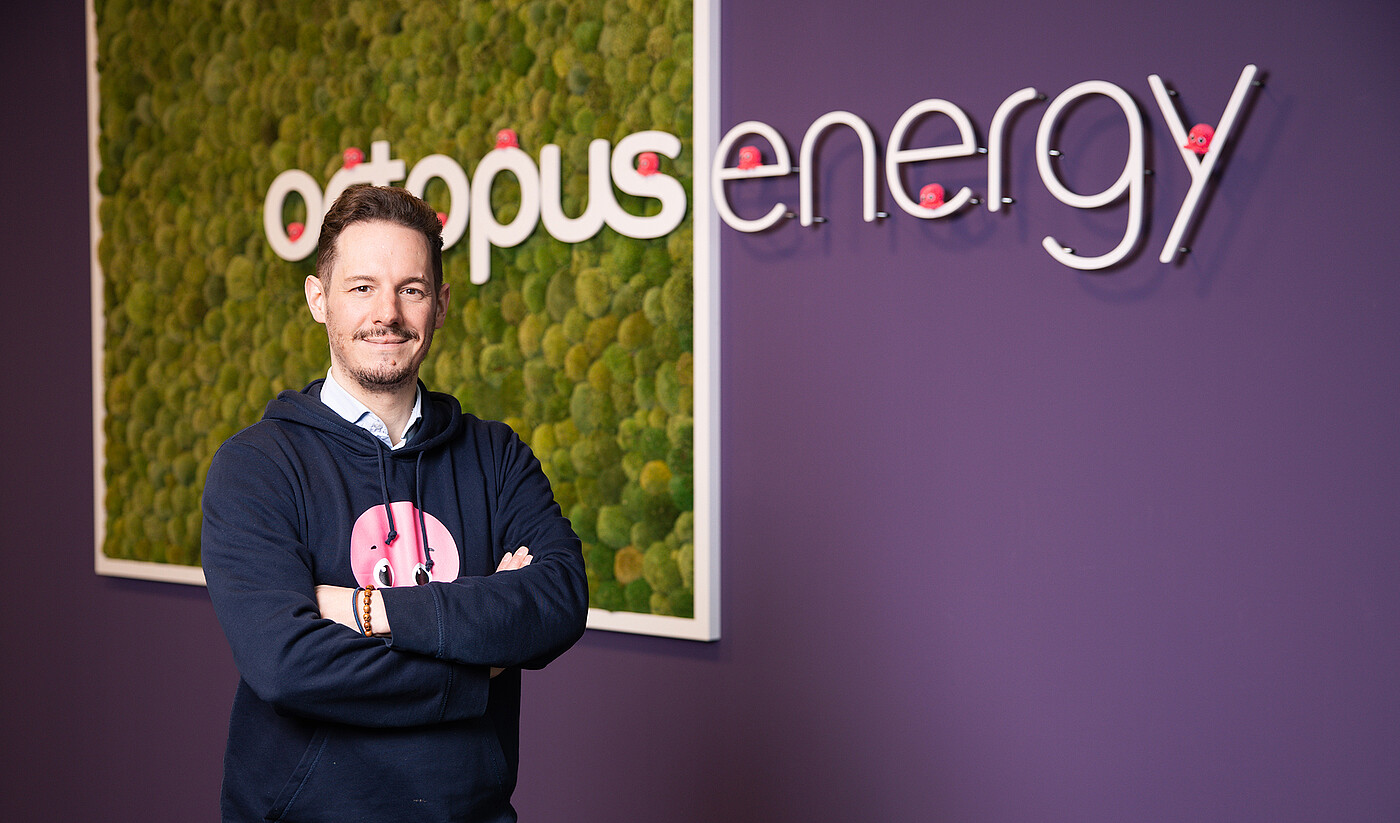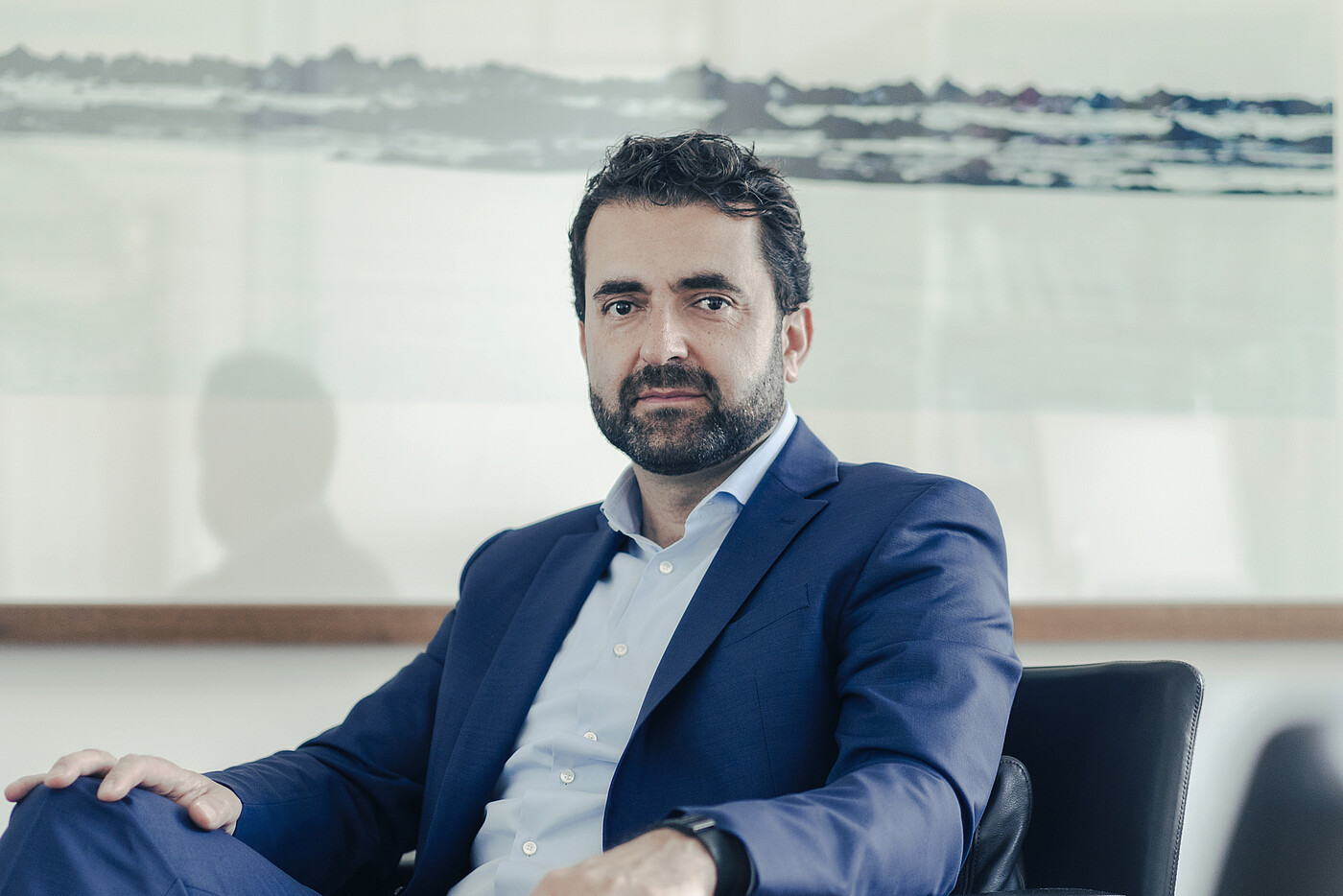Octopus Energy was founded in 2016 with the vision of accelerating the energy transition worldwide with the help of technology. This multi-award-winning renewable energy provider and EnerTech player now supplies more than five million customers worldwide. Octopus has been active in Germany since 2020 as the first tech company among energy providers. Bastian Gierull has accompanied Octopus Energy since it entered the German market and has been CEO of Octopus Energy Germany since July 2023. We spoke with him about the energy supply of the future, the importance of renewables for Germany as a business location and the role of policymakers.
What makes Octopus Energy stand out and what makes it different from other energy companies?
Energy companies are usually large, anonymous corporations. Their customers are often just numbers in Excel sheets. We put people at the centre. Our customers come first. That’s why Octopus Energy was founded, and it’s why we’re committed not just to a greener energy landscape, but also a fair one. This in turn helps us to attract both new customers and also talent. Young people are not the only ones who want more plain language and less small print. Moreover, Octopus is a tech company in an industry that is often still struggling with digitalisation. In less than ten years, we have achieved more than many traditional energy providers in their entire history.
You have been present on the German market with Octopus Energy since 2020. In your opinion, has a lot happened in the field of renewable energy in Germany since then or has Germany continued to lose a lot of time?
A lot has happened in the last few years. We already regularly cover most of our consumption with green electricity, we have cushioned the nuclear phase-out with renewables, and from the policy side, further hurdles to expansion are being removed bit by bit. I am always amazed by the negative public image. We have achieved a lot, and we are already seeing positive effects, even if that is not yet relflected in the price of electricity. Of course there are challenges. For example, we still too often get bogged down in petty red tape. When it takes months just to approve the transport of a wind turbine – separately in each municipality along the way – we are losing time we don’t have. We are not only switching to green electricity, we also want to profit from it! For this to happen, we must continue to invest in renewables and in grid expansion as well as consistent digitalisation, and rethink how we consume electricity.
According to the German government, the share of renewable energies in gross electricity consumption will be 46.6% in 2022 and 80% by 2030. These are ambitious goals when you look at the progress made in recent years. What effects can slow progress in expansion have on Germany as a business location?
We can already see in Bavaria what happens when wind power and grid expansion are delayed for too long. There, the topic was long thought of solely as a climate protection project. Unfortunately, many people are only now realising that electricity from wind power and solar energy is already cheaper than fossil alternatives and that the expansion of renewable energies is also an advantage for the economy and consumers. Projects like SuedLink should never have been delayed for so long. Of course, the price of electricity is only one factor among many for Germany as a business location. But energy-intensive industries in particular will think twice about where they invest in the future.
What does it take from policymakers to create affordable green electricity for companies in Germany and thus pave the pathway to zero envisaged by policymakers and business?
Green electricity is already affordable today. What is expensive is coal-fired electricity, which we still rely on when not enough green electricity reaches the companies. To reduce these expensive periods to a minimum, we need more renewables and more flexibility in the grid in the first place. So the current talk about diverting tax money from the climate fund to subsidise coal-fired electricity in the form of an industrial electricity price will achieve the opposite in the long run. Of course, policymakers can support companies, but every euro that flows into fossil energy distorts the market and delays the transition. In the long run, we are making ourselves weaker.
About Bastian Gierull
Bastian Gierull has accompanied Octopus Energy since its German market entry. Since July 2023, he has been the new CEO of Octopus Energy Germany. In addition to his role as CEO, he is responsible for the long-term growth strategy of the EnerTech company.
About Octopus Energy
Octopus Energy was founded in 2016 with the vision of accelerating the energy transition worldwide with the help of technology and leaving a large, green footprint as quickly as possible. The award-winning renewable energy provider and EnerTech player now serves more than five million customers worldwide. At the heart of its success is Kraken, a technology platform developed in-house that uses artificial intelligence to automate much of the energy supply chain, enabling superior customer service and operational efficiency. Octopus has been active in Germany since 2020 as the first tech company among energy suppliers in Germany and is present in 14 countries worldwide.
Photo: Octopus Energy

 LinkedIn
LinkedIn
 Twitter / X
Twitter / X

